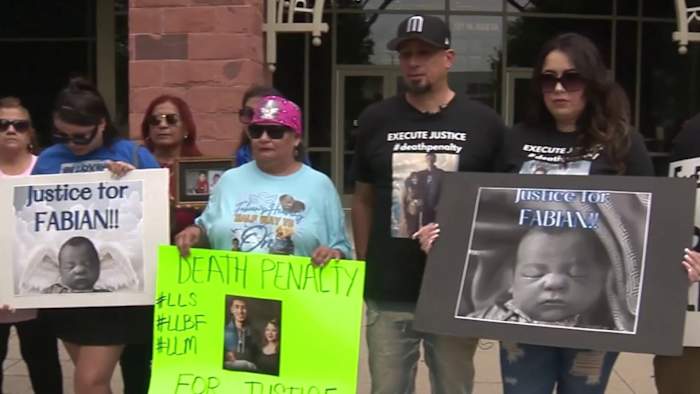Share this @internewscast.com

SAN ANTONIO – Just hours after two families united to urge the Bexar County District Attorney to pursue the death penalty against an accused killer of their loved ones, the office declared it would not seek to do so.
The Bexar County District Attorney’s Capital Crimes Committee on Friday ruled that the death penalty will not be pursued in the capital murder case of Christopher Preciado. He is charged with the shooting deaths of Matthew Guerra, 22, and Savanah Soto, 19.
A news release from the DA’s office states the committee, which consists of at least seven members, examined several factors, including the facts of the case, the suspect’s criminal history, and any known mitigating evidence.
Preciado, if found guilty by a jury, will face the maximum sentence of life in prison without parole.
“I fully acknowledge that the decision not to seek the death penalty will be difficult for the families of Savanah Soto and Matthew Guerra,” Bexar County District Attorney Joe Gonzales said in the news release. “I understand that no decision in this matter can be without its pain or consequences. Every case is different, and the goal is always to make a decision that is measured, thoughtful, and to the best of my ability, is fair, just, and in line with the values of our community.”
‘We all want the death penalty’
The victims’ families staged a joint protest Friday morning outside the Paul Elizondo Tower.
Guerra and Soto were found shot to death inside their car in December 2023, days after they were reported missing.
Soto was pregnant at the time and only days away from giving birth to a son they planned to name Fabian.
Preciado, who was 19 at the time, remains in jail on a charge of capital murder as he awaits trial.
“We’re just coming together because we all want the death penalty. He took three lives, and the least we can do is take his,” said Gabriel Guerra, Matthew’s father.
Gabriel Guerra was one of about a dozen members of both victims’ families who gathered outside the courthouse.
Some donned t-shirts with pictures of the victims, while others held up homemade posters.
“Our family’s torn apart. We’ll never have them in our lives,” said Rachel Soto, Savanah’s grandmother, fighting back tears. “It wasn’t right for none of them three to go the way they did, and (the suspects) need to pay.”
Preciado’s parents, Ramon Preciado, 55, and Myrta Romanos, 48, also face charges related to helping him conceal the bodies.
Ramon Preciado is currently out of jail after posting bond in February 2024.
The victims’ families say the timing of their protest outside the courthouse was to coincide with the committee’s meeting.
An emailed statement from DA Joe Gonzales’ office Friday morning explained how the process works:
The decision on whether to seek the death penalty for a defendant charged with capital murder is made according to established practice under the current administration. When ready, the lead prosecutor in a district court where the case is filed will request an appointment with the capital crimes committee in order to present a case for death penalty consideration.
The capital crimes committee, which is comprised of no less than 7 division chiefs and the elected district attorney, will hear and consider all the facts and circumstances of the case. Additionally, because a death penalty jury must vote on whether the defendant is a “continuing threat to society,” it will also take into account the defendant’s prior criminal history.
After the prosecutor delivers the presentation, the committee will make a recommendation. It is important to note that while the committee makes a recommendation, the final decision to seek the death penalty rests with District Attorney Joe Gonzales. Finally, while a decision whether to seek the death penalty is often made the same day as the presentation, there is a possibility the district attorney will take the committee’s recommendation under advisement and delay a final decision for a reasonable time.
Gabriel Guerra said his family was working to make changes for the future in other ways.
He says they are helping to carve out new legislation, Fabian’s Law, named for Savanah Soto’s unborn baby, “where people who have anything to do with the death of a baby are not going to be eligible for bond.”
Read also
Copyright 2025 by INC – All rights reserved.

















